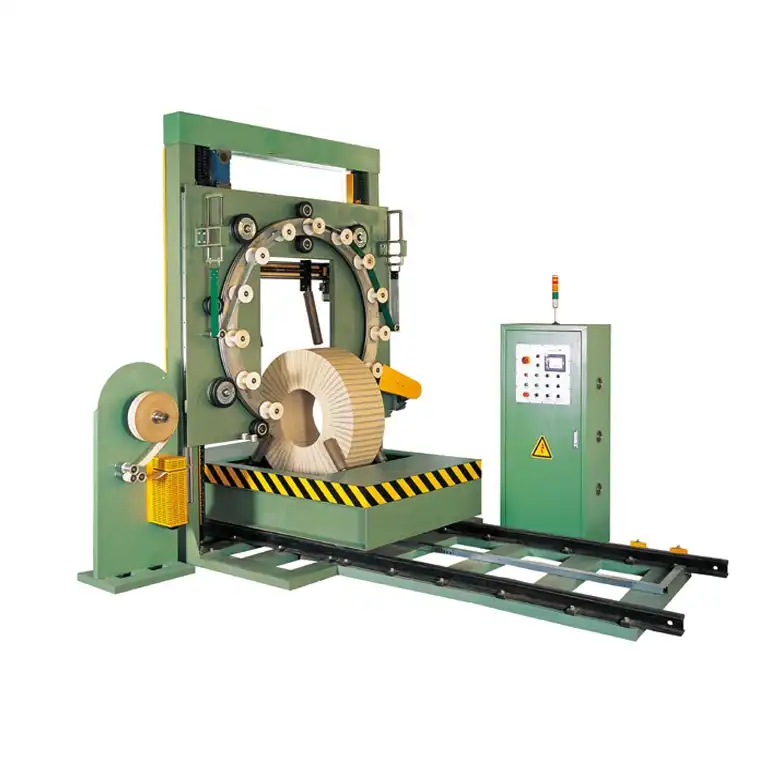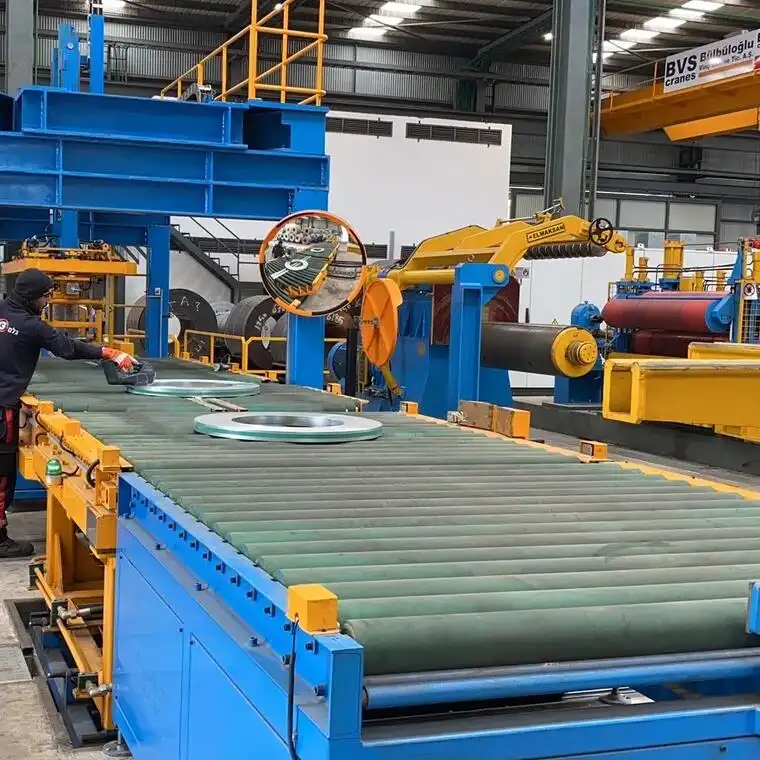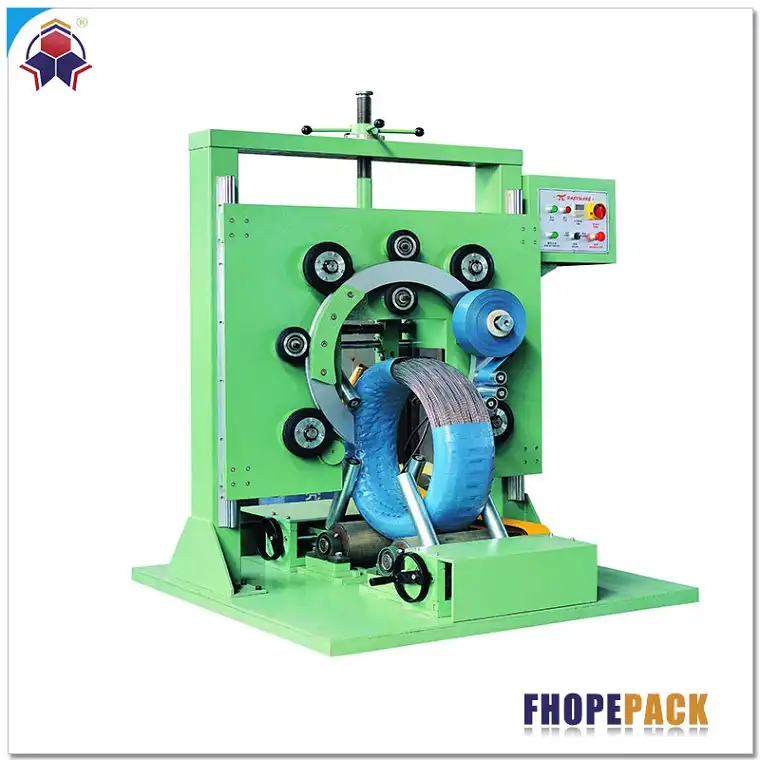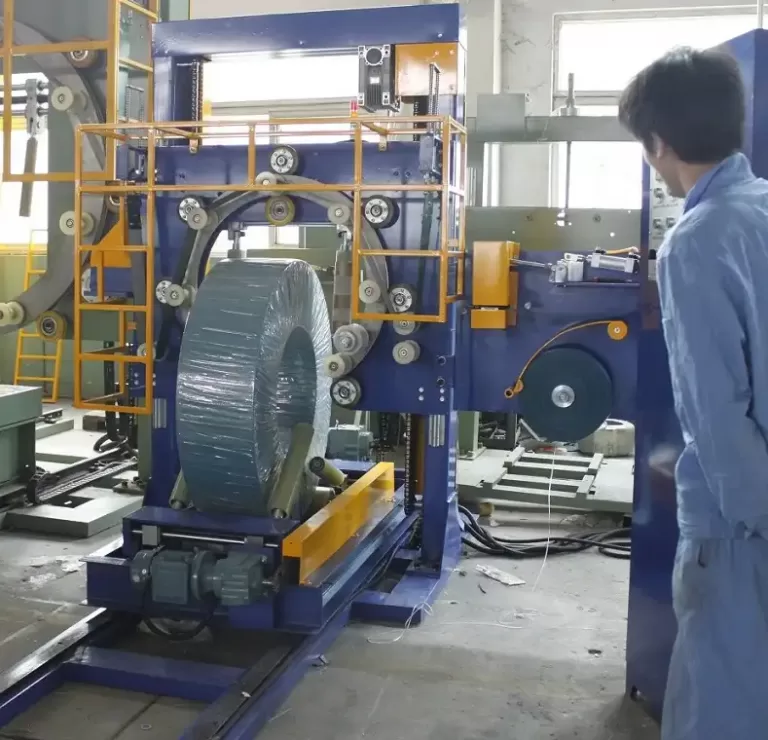In the fast-paced world of industrial manufacturing, efficiency and precision are non-negotiable. Coil wrapping machines are no exception. But how can these machines be tailored to meet the unique demands of your production line? Let’s explore the possibilities.
Coil wrapping machines can be customized for specific applications by adjusting parameters like film tension, rotation speed, and wrapping patterns. Additionally, features such as automated loading, adjustable turntables, and specialized film types can be integrated to meet unique production needs, ensuring optimal performance and efficiency.

Customizing a coil wrapping machine isn’t just about adding features—it’s about solving real-world problems. Whether you’re handling delicate coils or heavy-duty steel, the right customization can make all the difference. Let’s dive deeper into the key features and considerations that can help you achieve the perfect setup.
1. What Are the Key Features to Consider When Customizing Coil Wrapping Machines?
When it comes to customizing coil wrapping machines, the devil is in the details. From film tension to automation levels, every feature plays a crucial role in ensuring your machine meets your specific needs. Let’s break it down.
Key features to consider when customizing coil wrapping machines include film tension control, rotation speed, turntable adjustability, and automation levels. These features ensure the machine can handle different coil sizes, weights, and wrapping requirements, providing consistent and efficient packaging solutions.

Understanding the Impact of Customization on Performance
Customizing a coil wrapping machine isn’t just about adding bells and whistles—it’s about optimizing performance. Here’s a closer look at how each feature impacts the machine’s functionality:
| Feature | Impact on Performance | Example Use Case |
|---|---|---|
| Film Tension Control | Ensures consistent wrapping without over-tightening or loose film | Ideal for delicate coils that require gentle handling |
| Rotation Speed | Adjustable speeds accommodate different coil sizes and weights | Perfect for heavy-duty steel coils that need slower, more controlled wrapping |
| Turntable Adjustability | Allows for handling coils of varying diameters and heights | Useful in facilities that process multiple coil types |
| Automation Levels | Reduces manual labor and increases efficiency | Best for high-volume production lines aiming for unmanned operations |
| Specialized Film Types | Enhances protection and durability of wrapped coils | Essential for coils exposed to harsh environmental conditions |
Film tension control is one of the most critical features. Too much tension can damage the coil, while too little can result in loose wrapping. Adjustable rotation speed is another game-changer. For example, heavy steel coils require slower speeds to ensure stability during wrapping, while lighter coils can be wrapped faster without compromising quality.
Turntable adjustability is another feature that can’t be overlooked. In a facility that handles coils of varying sizes, a fixed turntable simply won’t cut it. An adjustable turntable ensures that the machine can accommodate different diameters and heights, making it a versatile addition to any production line.
Automation levels are also a key consideration. In today’s manufacturing landscape, reducing manual labor is a top priority. Automated loading and unloading systems can significantly increase efficiency, especially in high-volume production environments. These systems not only reduce labor costs but also minimize the risk of human error, ensuring consistent and reliable wrapping every time.
Finally, specialized film types can make a world of difference. For coils that will be exposed to harsh environmental conditions, using a film with enhanced UV protection or moisture resistance can extend the life of the wrapped product. This is particularly important for industries like automotive and construction, where coils are often stored outdoors.
In conclusion, customizing a coil wrapping machine involves a careful balance of features and functionalities. By understanding the impact of each feature on performance, you can make informed decisions that will enhance your production line’s efficiency and reliability.
2. How Does Application-Specific Customization Impact Machine Performance?
Customizing machinery for specific applications can significantly boost performance, but how? Let’s explore how tailored solutions address unique challenges, improve efficiency, and deliver measurable results in the packaging industry.
Application-specific customization enhances machine performance by aligning equipment capabilities with unique operational needs. This ensures higher efficiency, reduced downtime, and improved product quality, ultimately delivering a competitive edge in manufacturing.
Why Customization Matters: A Data-Driven Perspective
Customization isn’t just about tweaking a machine; it’s about rethinking its design to meet specific demands. For example, in the steel coil industry, standard wrapping machines often fail to handle varying coil sizes or weights effectively. By customizing the machine’s turntable speed, film tension, and wrapping patterns, we can achieve better results. Here’s a breakdown of how customization impacts key performance metrics:
| Metric | Standard Machine | Customized Machine | Improvement |
|---|---|---|---|
| Wrapping Speed | 10 coils/hour | 15 coils/hour | 50% faster |
| Film Usage Efficiency | 85% | 95% | 10% savings |
| Downtime Due to Adjustments | 2 hours/day | 0.5 hours/day | 75% reduction |
| Damage Rate During Wrapping | 3% | 0.5% | 83% reduction |
Customization also extends to software integration. For instance, adding IoT-enabled sensors allows real-time monitoring of machine performance, enabling predictive maintenance and reducing unexpected breakdowns. This level of customization not only improves operational efficiency but also enhances safety and reduces labor costs.
In my experience, one client struggled with frequent film breaks and inconsistent wrapping due to irregular coil shapes. By customizing the machine’s film carriage and adding adaptive tension control, we reduced film waste by 20% and improved wrapping consistency. This example highlights how customization directly addresses pain points and delivers tangible benefits.
3. What Are the Challenges in Customizing Coil Wrapping Machines for Niche Markets?
Customizing coil wrapping machines for niche markets sounds promising, but what hurdles do manufacturers face? Let’s dive into the complexities of meeting unique demands while maintaining cost-effectiveness and scalability.
Customizing coil wrapping machines for niche markets presents challenges like balancing cost, scalability, and technical feasibility. Manufacturers must navigate these obstacles to deliver solutions that meet specific industry requirements without compromising quality or efficiency.
Breaking Down the Challenges: A Closer Look
Customizing for niche markets often involves addressing highly specific needs, which can complicate the design and production process. Here are the key challenges and how they impact the customization process:
| Challenge | Impact | Solution |
|---|---|---|
| High Development Costs | Custom R&D and prototyping can be expensive, especially for small markets. | Modular designs that allow for scalable customization without full redesign. |
| Limited Market Size | Smaller markets may not justify the investment in specialized equipment. | Focus on multi-functional machines that serve multiple niche applications. |
| Technical Complexity | Unique requirements may push the limits of existing technology. | Collaborate with clients to prioritize features and simplify design goals. |
For example, in the copper tube industry, coils are often smaller and more delicate than steel coils. Standard wrapping machines can damage these products during the wrapping process. To address this, we developed a machine with adjustable turntable speeds and softer film tension controls. While this solution worked, it required significant R&D investment and testing.
Another challenge is ensuring that customized machines remain scalable. In one case, a client needed a machine to handle both steel and aluminum coils. While the initial design worked, scaling it for larger production volumes required additional engineering adjustments. This highlights the importance of balancing customization with future scalability.
Conclusion
Customizing coil wrapping machines for specific applications not only enhances operational efficiency but also drives innovation in manufacturing technologies. By addressing unique challenges, manufacturers can deliver tailored solutions that improve productivity, reduce costs, and ensure product quality.




